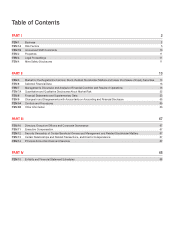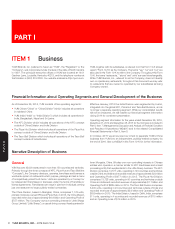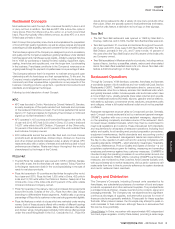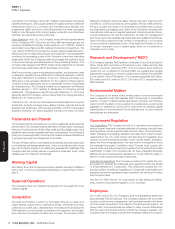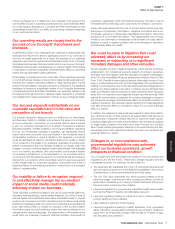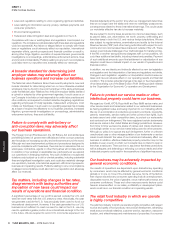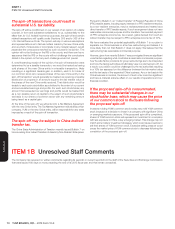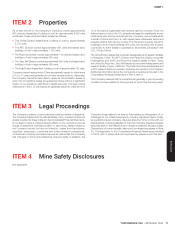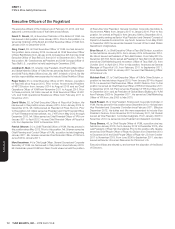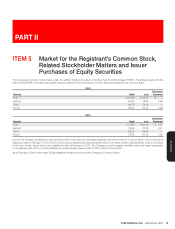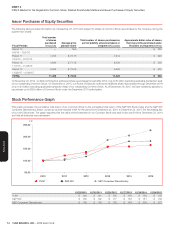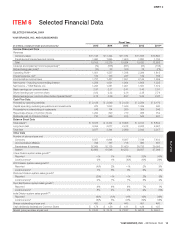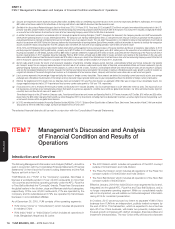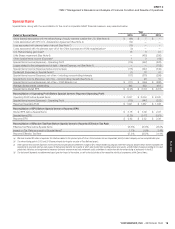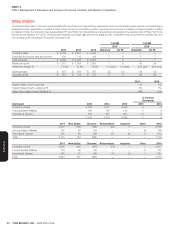Pizza Hut 2015 Annual Report Download - page 118
Download and view the complete annual report
Please find page 118 of the 2015 Pizza Hut annual report below. You can navigate through the pages in the report by either clicking on the pages listed below, or by using the keyword search tool below to find specific information within the annual report.
YUM! BRANDS, INC.-2015 Form10-K10
Form 10-K
PART I
ITEM 1BUnresolved Staff Comments
The spin-off transactions could result in
substantial U.S. tax liability.
The spin-off will be conditioned on our receipt of an opinion of outside
counsel, in form and substance satisfactory to us, substantially to the
effect that, for U.S. federal income tax purposes, the spin-off and certain
related transactions will qualify under Sections 355 and/or 368 of the
U.S.Internal Revenue Code. The opinion will rely on various assumptions
and representations as to factual matters made by the new China entity
and us which, if inaccurate or incomplete in any material respect, would
jeopardize the conclusions reached by such counsel in its opinion. The
opinion will not be binding on the IRS or the courts, and there can be no
assurance that the IRS or the courts will not challenge the conclusions
stated in the opinion or that any such challenge would not prevail.
If, notwithstanding receipt of the opinion, the spin-off transaction were
determined to be a taxable transaction, we would be treated as having
sold shares of the new China entity in a taxable transaction, likely
resulting in a significant taxable gain. In addition, each U.S. holder of
our common stock who receives shares of the new China entity in the
spin-off transaction would generally be treated as receiving a taxable
distribution of property in an amount equal to the fair market value of
the shares of the new China entity received. That distribution would be
taxable to each such stockholder as a dividend to the extent of our current
and accumulated earnings and profits. For each such stockholder, any
amount that exceeded our earnings and profits would be treated first
as a non-taxable return of capital to the extent of such stockholder’s
tax basis in our shares of common stock with any remaining amount
being taxed as a capital gain.
At the time of the spin-off, we will enter into a Tax Matters Agreement
with the new China entity. The Tax Matters Agreement will address which
company, YUM or the new China entity, will be responsible for any taxes
imposed as a result of the spin-off transaction.
The spin-off may be subject to China indirect
transfer tax.
The China State Administration of Taxation recently issued Bulletin 7 on
Income arising from Indirect Transfers of Assets by Non-Resident Enterprises.
Pursuant to Bulletin 7, an “indirect transfer” of People’s Republic of China
(PRC) taxable assets, including equity interests in a PRC resident enterprise,
by a non-resident enterprise, may be recharacterized and treated as a
direct transfer of PRC taxable assets, if such arrangement does not have
reasonable commercial purpose and the transferor has avoided payment
of PRC enterprise income tax. As a result, gains derived from such an
indirect transfer may be subject to PRC enterprise income tax of 10%.
We have evaluated the potential applicability of Bulletin 7 to our plan to
separate our China business in a tax free restructuring and believe it is
more likely than not that Bulletin 7 does not apply. We believe that the
restructuring has reasonable commercial purpose.
However, given how recently Bulletin 7 was promulgated there are significant
uncertainties regarding what constitutes a reasonable commercial purpose,
how the safe harbor provisions for group restructurings are to be interpreted
and how the taxing authorities will ultimately view our planned spin-off. As
a result, our position could be challenged by the tax authorities resulting
in a 10% tax assessed on the difference between the fair market value
and the tax basis of the separated China business. As our tax basis in the
China business is minimal, the amount of such a tax could be significant
and have a material adverse effect on our results of operations and our
financial condition.
If the proposed spin-off is consummated,
there may be substantial changes in our
stockholder base, which may cause the price
of our common stock to fluctuate following
the proposed spin-off.
Investors holding YUM’s common stock today may hold YUM common
stock because of a decision to invest in a company with significant China
or emerging markets exposure. If the proposed spin-off is completed,
shares of YUM common stock will represent an investment in a company
with less exposure to China, a key emerging market. This change may not
match some holders’ investment strategies, which could cause investors to
sell their shares of YUM common stock. Excessive selling pressure could
cause the market price of YUM common stock to decrease following the
completion of the proposed spin-off.
ITEM 1B Unresolved Staff Comments
The Company has received no written comments regarding its periodic or current reports from the staff of the Securities and Exchange Commission
that were issued 180 days or more preceding the end of its 2015 fiscal year and that remain unresolved.


